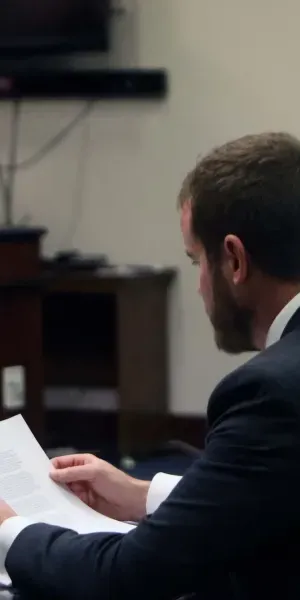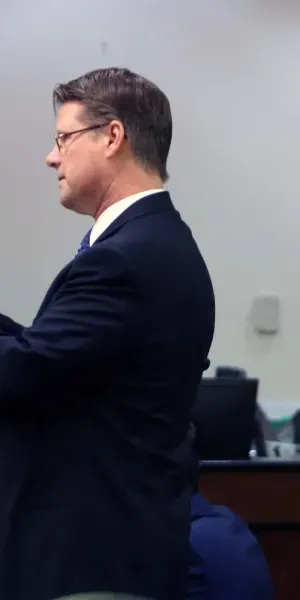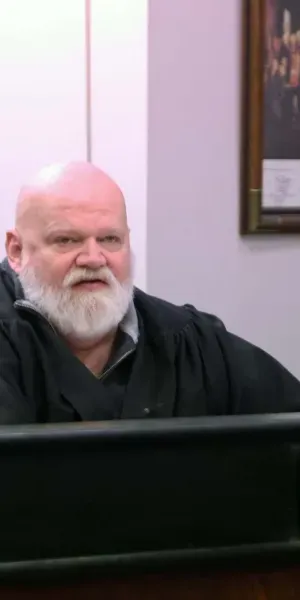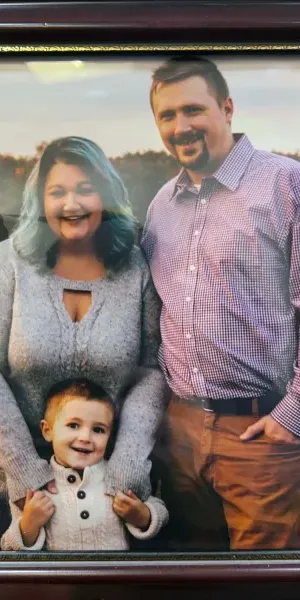Yesterday, Abdikadir Shire came before Ashland Municipal Court Judge John Good and the family of John Keener for the sentencing hearing after pleading guilty on Vehicular Manslaughter in the death of John Keener. It was a somber and emotional day as friends and family gathered to express their grief and anger at the devastating loss of their beloved John Keener. The heartfelt statements from John’s family shed light on the impact he had on their lives and the immense pain caused by his untimely death.
This tragic event unfolded when multiple 911 callers reported a collision between a 2012 Freightliner semi-truck, driven by a 37-year-old resident of Saint Paul, Minnesota named Abdikadir Abshir Shire, and a 2001 Toyota Camry operated by John Thomas Keener, a 40-year-old resident of Ashland, Ohio on the morning of Wednesday, November 1st, 2023, at the intersection of State Route 302 and US 42 in Ashland County, Ohio.
A Precious Bond
In a statement to the court, Katy Keener, John’s sister, recollected cherished memories and the deep bond they shared. She vividly painted a picture of their childhood together, filled with love, sibling squabbles, and moments of joy. She spoke of wanting to relive those memories and hold on to the connection they had. The loss of John has left a void that cannot be filled, and Katy struggles with the pain of knowing she will never be able to talk to him or see him again in this life.
A Family United in Grief
Jenny Uebel, John’s older sister, also spoke of the impact John had on their lives. She shared memories of his birth and the close relationship they had as siblings. She highlighted John’s musical talent, his love for computers, and his journey to become a successful mechanical engineer. The loss of John has left a significant hole in their lives, especially for John’s young son, Colin, and their aging parents.
Unanswered Questions and Lingering Grief
Deborah Keener, John’s sister-in-law, directed her words towards the driver responsible for John’s death. She expressed her deep anguish and asked the driver if he truly understood the magnitude of his actions. As a fellow CDL driver, she emphasized the training and responsibilities that come with the profession. Deborah questioned why the driver failed to stop at the intersection and the impact it had on their life. She conveyed the raw pain and sorrow experienced by the Keener family, and their longing for justice and closure.
The Pain of Loss
The loss of John Keener has created an unfillable void in the lives of his family and friends. Each day brings a reminder of his absence, and the grief they carry is a constant presence. The tragic accident that took John’s life has left them with unanswered questions, aching hearts, and shattered dreams. The pain they feel is unimaginable, and they struggle to find solace in their memories and faith.
Seeking Justice and Healing
The Keener family hopes that through sharing their experiences, they can shine a light on the devastating consequences of reckless actions on the road. They believe that stronger penalties should be imposed on those who commit such acts of negligence, in order to prevent further loss and heartache for other families. Their plea for justice is driven by the love they had for John and the desire to prevent others from experiencing a similar tragedy.
Understanding the Complexity of a Tragic Accident and the Constraints of the Judicial System
Municipal Court Judge John Good delivered a emotional speech while handing down the maximum sentence to a truck driver involved in a fatal accident. The judge’s words reflected his deep understanding of the circumstances surrounding the incident, as well as the limitations imposed by the legal system.
The Judge’s Personal Reflections
Judge Good began his speech by expressing his gratitude for the opportunity to serve as a judge in Ashland County. He acknowledged the privilege, humility, and satisfaction he derives from his role, highlighting that most days, he loves his job. However, he acknowledged that this is not one of those days.
The Limitations of the Court
Judge Good recognized the public’s skepticism in the court’s ability to administer justice in this particular case. He acknowledged the validity of their concerns, especially in light of the tragic loss suffered by the victim’s family. The judge emphasized the need for objectivity and impartiality, as well as the court’s responsibility to control emotions. Despite these constraints, he acknowledged the difficulty in providing a resolution that truly satisfies the principles of justice.
A Heartfelt Acknowledgment
During his speech, Judge Good expressed his deep appreciation for the heartfelt statements made by several individuals closely affected by the accident. Their words touched him, particularly the remarks made by Miss Uebel and Miss Keener. However, the judge acknowledged the inherent limitations in offering solace or healing to the grieving family. He recognized that the pain and loss caused by the accident are irreplaceable.
A Case of Negligence, Not Murder
The judge directed his attention to the truck driver, highlighting that the accident was not a deliberate act of murder. The incident was, as one speaker aptly described, an accident. Nevertheless, the repercussions of this accident will have lasting consequences for everyone involved.
The Act of Negligence and Its Consequences
Judge Good explained that the truck driver’s actions constituted negligence and a failure of due care. The driver failed to exercise the necessary attention while driving on unfamiliar roads. Despite the presence of warning signs, including rumble strips, flashing lights, and stop signs, the driver negligently proceeded through the intersection. Tragically, this act of negligence resulted in the loss of a life and forever changed the lives of both families.
Understanding the Legal Perspective
Considering different culpable mental states, the judge classified the truck driver’s conduct as negligence, as opposed to intentional or reckless behavior. The charge of vehicular manslaughter, a second-degree misdemeanor, accurately described the level of culpability. The judge emphasized that the maximum penalty for this offense, as prescribed by law, is 90 days in the county jail, a two-year license suspension, and a $750 fine.
The Sentencing Decision
In determining an appropriate sentence, Judge Good had to consider whether a jail sentence was necessary. Despite recognizing the genuine remorse shown by the truck driver and the stress of the situation, the judge was troubled by the driver’s initial dishonesty when questioned by authorities. His false statement about stopping at the stop sign raised concerns about his credibility and accountability.
Acknowledging the Magnitude of Loss
The judge acknowledged that no amount of punishment could truly match the magnitude of the loss experienced by the victim’s family. While a maximum sentence does convey the seriousness of the offense, Judge Good believed that even this was insufficient in capturing the gravity of the driver’s behavior.
The Sentence
Ultimately, Judge Good sentenced the truck driver to the maximum penalty allowed by law: 90 days in the county jail, an fine of $750, and a two-year license suspension. The judge acknowledged that this sentence, while necessary, still fails to fully address the gravity of the situation.
Conclusion
The sentencing hearing for Abdikadir Shire served as a painful reminder of the profound loss suffered by the Keener family. Their heartfelt statements expressed a range of emotions, from anger and frustration to deep sorrow and longing. John Keener’s untimely death has left a void in the lives of his loved ones that can never be filled. Through their grief, the family hopes to raise awareness about the devastating consequences of distracted driving and advocate for stronger penalties. They cherish the memories they have of John and hold onto the hope of one day being reunited with him.
Judge Good’s poignant speech during the sentencing of a truck driver involved in a tragic accident reveals the complex nature of the legal system and its limitations in providing complete justice. The judge’s words reflect his understanding of the pain and grief experienced by both families involved. While the sentence may seem inadequate to some, it represents the full extent of the court’s power under current legislation. As the community grapples with the aftermath of this devastating incident, it underscores the need for ongoing discussions and potential reforms to prevent such accidents from happening in the future.






















